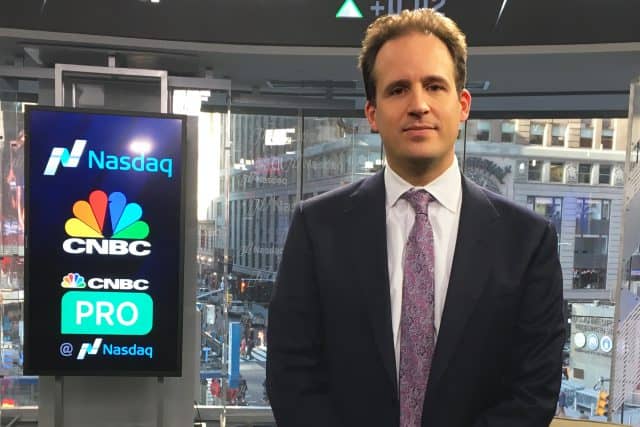Rep. Michele Hoitenga (R-Manton) doesn’t care much for community broadband, so she introduced a bill in the Michigan legislature that is as stark as it is short:
House Bill 5099:
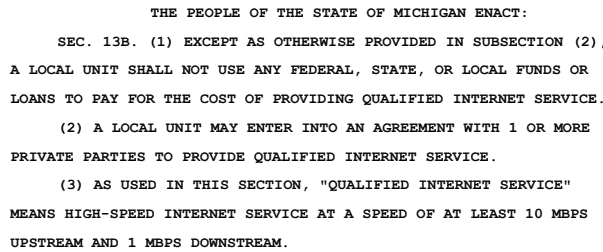
The bill is remarkable for its brevity — most proposed community broadband ban bills avoid outright bans, preferring to use forced complicated referendums or operational limitations that usually make municipal broadband projects untenable. But Rep. Hoitenga’s bill leaves no doubt she wants private cable and phone companies left unmolested by publicly funded alternatives. Although the Michigan Republican chairs the House’s Communications and Technology committee, she appears confused about the difference between upload and download speeds. Her bill would define a “qualified” internet service as one offering at least 1/10Mbps service. Yes — 1Mbps download speed and 10Mbps upload speed.
Ars Technica’s Jon Brodkin asked Rep. Hoitenga about the oddity of the language in her bill:
When asked about this on Twitter, Hoitenga said she would have to “speak with the attorneys who wrote the bill” to determine whether the listed speed was a mistake. “I will speak with the attorneys who wrote the bill. They changed the language I submitted but will ask why they changed it,” Hoitenga wrote.

Rep. Hoitenga
Rep. Hoitenga used her Twitter account to promote and defend her bill, pointing out the district she represents had “37 providers” to choose from — a fact she gleaned from an online AT&T Yellow Pages directory. Stop the Cap! investigated that claim and found the majority of the providers cited did not offer internet access to members of her district, provided service only in adjacent communities, or sold commercial internet services to businesses only. In fact, for the overwhelming majority of her constituents, there are only two providers to choose from — AT&T or Comcast. Both are top donors to Rep. Hoitenga’s campaign, but more on that later.
Michigan has never been a hotbed of community broadband initiatives, despite having uneven broadband service in suburban and rural areas across the state. Michigan law already includes several significant roadblocks for public broadband projects, notes Lisa Gonzalez from the Institute for Local Self-Reliance:
“Michigan already has a significant state barrier in place; municipalities that wish to improve connectivity must first appeal to the private sector and can only invest in a network if they receive fewer than three qualifying bids. If a local community then goes on to build a publicly owned network, they must comply with the terms of the RFP, even though terms for a private sector vendor may not be ideal for a public entity.
“Nevertheless, several communities in Michigan have dealt with the restrictions in recent years as a way to ameliorate poor connectivity. They’ve come to realize that their local economies and the livelihood of their towns depend on improving Internet access for businesses, institutions, and residents.”
Although Rep. Hoitenga’s bill offers the possibility for “public-private” partnerships, her bill would bring a significant chilling effect because the proposed law fails to define how such partnerships should be structured.
Rep. Hoitenga told Stop the Cap! the bill would put a stop to tax dollars being spent on broadband service, something she felt was unwarranted. We asked the Michigan representative, “Did you know the phone and cable companies receive taxpayer subsidies already in the form of PILOT agreements, and other incentives?” which received the non-sequitur response that her office’s phones were ringing constantly with callers praising her new bill.
But that isn’t what Rep. Hoitenga told her Facebook fans.
“Many individuals have reached out to my office in regards to HB5099; with the belief that I am attempting to limit broadband expansion,” Hoitenga wrote. “This could not be further from the truth. One of my main goals as the Chair of the House Communications and Technology committee is to make internet access more easily obtainable. This legislation does indeed prevent cities from using tax dollars to subsidize ISPs; especially without a vote of the people. While at first glance government operated networks may sound like a good idea, the argument in support of them crumbles with an in depth look into the financial and long-term investment side of implementing such a network.”
So we remain unsure if the wave of phone calls Hoitenga referenced were in support of her proposed bill or opposed to it. Either way, the Michigan representative mischaracterized her own three-paragraph bill by claiming it would prevent cities from using tax dollars for internet service, “without a vote of the people.” But no provision for such a vote exists or would be allowed by her existing bill. Hoitenga’s bill also clearly makes internet access less obtainable, especially in communities where a for profit provider does not exist and a community is seeking to provide an alternative.
Hoitenga later states communities may not need to worry about internet accessibility because, “there is also a package of bills in the senate regarding Small Cell Technology (which also attempts to reduce barriers),” she wrote. That provision is backed by AT&T, which is currently one of the two ISPs serving her district.
She then picks up familiar talking points distributed by public broadband opponents:
“There are examples throughout the state and nation of taxpayers being on the hook for failed networks. There is also concern that some of these networks are in towns where employee pensions are severely underfunded, causing layoffs and cutting services, yet there seems to be money for high risk broadband investments. It’s time to address these issues.
“My colleagues and I have introduced legislation that aims to remove some of the current barriers (HB5096-5098), and help streamline the broadband expansion and installation process for private providers. Municipalities should not be allowed to push out the free markets with unlimited tax payer resources and unfair advantages but could partner with providers to offer fiber for expansion to unserved areas.”
She also cited a 2017 study critical of municipal broadband networks authored by University of Pennsylvania Law School Professor Christopher Yoo and co-author Timothy Pfenninger. Neither author or Rep. Hoitenga disclosed the group that produced the study is funded by AT&T and Comcast, among other large telecom companies and their respective lobbying organizations.

After opening a dialogue with the Michigan representative, she did not take kindly to questions or criticism about her bill, and summarily blocked Stop the Cap! from seeing her Tweets or communicating with her further — the first time anyone has blocked our group on Twitter. Shortly after that, she changed her Twitter channel to be viewable by invitation only, limiting her potential audience to her 284 current followers. At the moment, the only social media outlet that seems to be still open to communicating with Rep. Hoitenga is Facebook, where she is taking heat from her constituents about her bill.
The Michigan representative has been behind several controversial bills introduced in the current session of the Michigan House, including a proposal to allow concealed pistols to be carried in public and a ban on Sharia law being practiced in the United States.
Her top donors for the current legislative session include:
#2 – Telecommunications Association of Michigan PAC, $3,000
#4 – AT&T Michigan, $1,500
#11 – Comcast Corp. & NBC Universal, $500
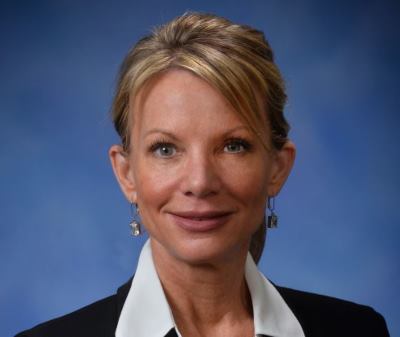


 Subscribe
Subscribe


 4GCommunity.org, a non-profit provider of unlimited 4G LTE wireless internet service, is
4GCommunity.org, a non-profit provider of unlimited 4G LTE wireless internet service, is 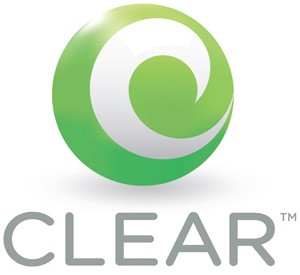
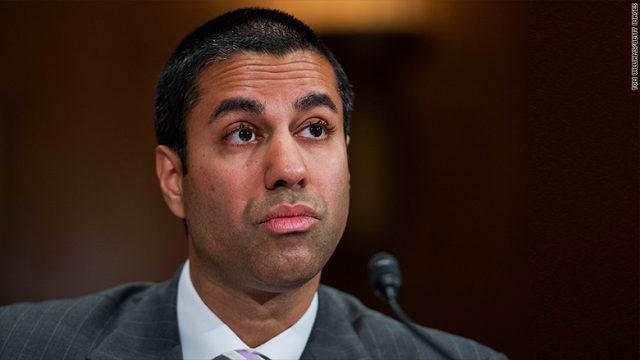
 Any move to challenge media companies’ licenses, however, would likely face significant hurdles.
Any move to challenge media companies’ licenses, however, would likely face significant hurdles. Cable operators that have watched their stocks get pounded after warning their third quarter earnings would reflect an undeniable trend towards cord-cutting are considering dramatically raising broadband-only pricing to $80 or more to protect profits.
Cable operators that have watched their stocks get pounded after warning their third quarter earnings would reflect an undeniable trend towards cord-cutting are considering dramatically raising broadband-only pricing to $80 or more to protect profits.